10 Recent Magical Realism Novels
What defines a magical realism novel? The presence of magic, obviously! But that’s an extremely broad definition. So broad, in fact, that it can absorb other genres (like fantasy). Generally speaking, magical realism novels are characterized by its overall adherence to realism…except for the magic. Beyond that, well, there’s a lot of confusion.
Sometimes the magic permeates the text, jumping out at you from every page, while in other instances the magic is occasional. Regardless of how much magic there is, what counts as “magic” is widely disputed and largely disagreed upon. Some scholars include anything that is not typically the domain of the “real,” the broadness of which can see the label “magical realism” applied to folklore, mythology, fairytales, fantasy, speculative fiction, paranormal literature, and more. Others are very specific, considering only works where the tone is highly objective — even journalistic — but the characters or events break from reality.
Despite the term “magical realism” having its roots in 1920s German art criticism, most literary uses of the term are traced to the Latin American “Boom” literature of the 1960s. In his essay “What We Talk About When We Talk About Magical Realism,” Fernando Sdrigotti underscores the damaging ways that magical realism has been used to essentialize, exoticize, and pigeonhole writers of color — most especially Latinx and Latin American writers.
Toni Morrison was very public about the downsides of using magical realism to define her works (and those of other BIPOC writers). Similarly, Cherokee writer Brandon Hobson has discussed what he sees as the problematic use of the word magic, explaining that magic is “a little cheap way of talking about it.” They’re not alone.
The major issue with the term magical realism is that it has a history of being applied to works by minority writers, especially BIPOC writers the world wide. What’s especially troubling about this is the fact that this application tends to come from a Eurocentric position that labels “magical” any beliefs considered “irrational” or “unreal” from a very narrow perspective. For example, ghosts are typical figures in magical realism novels; at the same time, many cultures consider ghosts to be a natural reality. The same is true of religious practices, cultural traditions, and other phenomena that the western intellectual tradition doesn’t acknowledge as “real.” Admittedly, magical realism has some problems.
So why continue to use this label? Well, for better or worse it’s a term that has gained traction in the publishing industry. That means it’s legible and defines a particular category of literature (however imprecisely). If you can name it, you can think and talk about it more deeply. More than that, I argue that despite the harm that has been done through the problematic application of this term, it has a long and rich history of revolutionary work.
Writers like Salman Rushdie, Gabriel García Márquez, and Isabel Allende have employed the genre toward anti-colonial aims. There are various subsets of magical realism — such as feminist magical realism — that use magic to disrupt dominant ideologies. And, of course, there’s what you might think of as “magical realism lite” (which I do not intend as a dig — in fact, I consider it a highly enjoyable subset of the genre), such as the mesmerizing works of Sarah Addison Allen.
No matter how you understand the label “magical realism,” it’s a rich and diverse genre. Here are some recent magical realism novels to help you infuse your bookshelf with some magic!
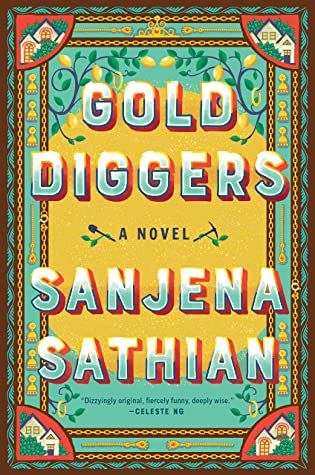
Gold Diggers by Sanjena Sathian
Sanjena Sathian’s debut novel is a compelling portrayal of history, ambition, and race in the United States. The fascinating premise of Gold Diggers is that high schooler Neil Narayan, a second generation Indian American growing up in the Atlanta suburbs, is lost. His peers are full of ambitions, but he is floundering. Until the day he discovers the girl next door, Anita Dayal, and her secret: magical lemonade. The alchemical concoction allows the drinker to imbibe the hopes, dreams, and ambitions of others. Sathina weaves a captivating story that brings together histories of racism during the Gold Rush, contemporary immigrant narratives, and the stereotype of the model minority…and breaks them all to pieces in a most thought-provoking and enjoyable way.
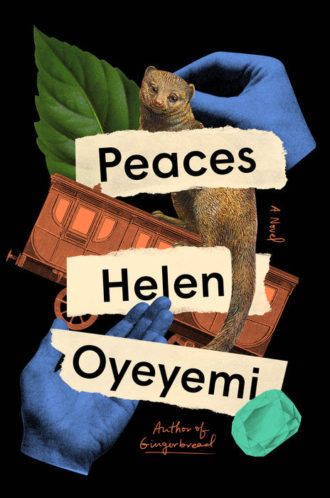
Peaces by Helen Oyeyemi
If “existential magical realism” is a category, then Peaces is its embodiment. What does it mean to see or be seen by someone else? What about to be unseen? These are the questions at the heart of this unusual read. Otto and Xavier are on their honeymoon…sort of: a journey aboard The Lucky Day (a train with a checkered history). As soon as they board the train, Xavier sees its owner from afar and she is holding up a sign that reads either HELP or HELLO. As you might imagine, this cryptic message kicks off the latest novel by one of the most powerful contemporary writers of magical realism. Otto and Xavier explore the train (did I mention they brought their pet mongoose with them?), reveal long-kept secrets, and encounter all manner of unconventional characters as they try to unravel the mystery of their journey. As with Oyeyemi’s other works, Peaces has a delightfully sinister edge to its brand of magical realism.
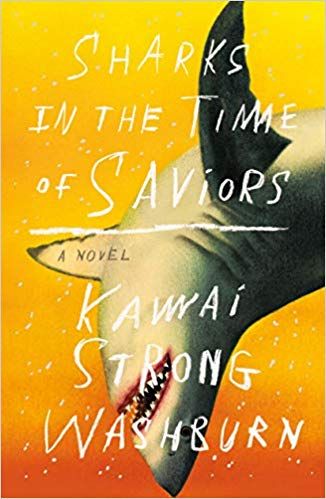
Sharks in the Time of Saviors by Kawai Strong Washburn
This is a story about family and history. When young Noa falls into the Pacific Ocean, his family is sure the sharks that appear are going to kill him. Instead, they lift him up in their teeth and gingerly deliver him to his mother. After that, Noa is literally the stuff of legends. His siblings, Dean and Kaui, are neglected in Noa’s shadow as his parents attempt to support him with his emergent powers. Sharks in the Time of Saviors follows these three siblings into adulthood, tracing their love for each other and their various ways of trying to mitigate the family’s debilitating poverty. As the novel unfolds, Dean’s and Kaui’s own magical abilities reveal themselves. Is the magic enough to help them move past systemic racism, poverty, and past traumas? Washburn infuses this page-turner with magic as he explores a host of issues (not the least of which is the importance of investing in “home”) in this brilliant and sweeping debut novel.
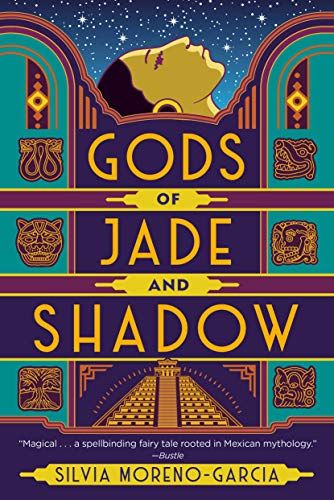
Gods of Jade and Shadow by Silvia Moreno-Garcia
Most of Silvia Moreno-Garcia’s books contain magic to some degree. Mexican Gothic, for instance, is dripping with magic (but it’s technically gothic horror, as the title implies). With Gods of Jade and Shadow, Moreno-Garcia takes readers on a wild journey through Jazz Age Mexico. Protagonist Casiopea is going about her life and dreaming of more when she happens upon a mysterious box in her grandfather’s room. As you might expect, opening the box opens up a world of trouble: it conjoins Casiopea’s fate with that of with the Mayan god of death. They work together agains his brother, and along the way there is treachery, adventure, and (of course) love. In Gods of Jade and Shadow, Moreno-Garcia has created a magical realism novel that is basically impossible to put down.
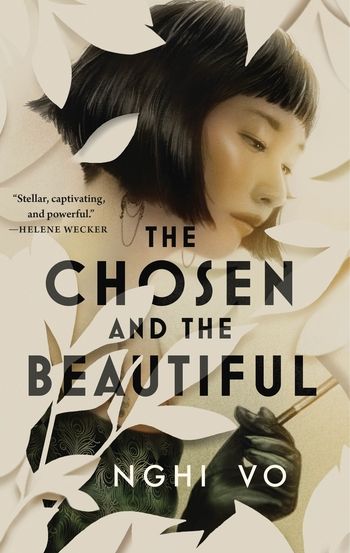
The Chosen and the Beautiful by Nghi Vo
Who would ever have imagined a queer rewriting of The Great Gatsby could be this amazing? Okay, probably just about everyone. Maybe the real question is actually when Nghi Vo plans to publish another book, because this book is amazing. Jordan and Daisy begin to fly through the house during the very first chapter, giving a nod to the whimsical reimagining of Fitzgerald’s classic work. But Vo’s novel breaks free from the sanitized style of Modernist literature to luxuriate in its extravagant magical realism in a way that does the Roaring 20s proud. More than that, it brings a critical perspective on race and Orientalism to bear on the early 20th century. Jordan — tennis star and queer Vietnamese adoptee — is the protagonist of this story…and what a protagonist she is! There’s magic, deals with the devil, enchanted alcohol, impossible feats, and more. Fitzgerald’s novel may give the book its deepest foundations, but the beating heart of this story is all Vo’s.
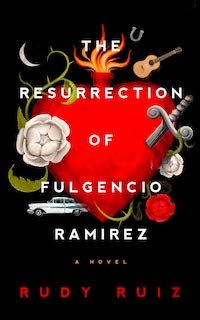
The Resurrection of Fulgencio Ramirez by Rudy Ruiz
Rudy Ruiz’s imaginative magical realism novel is a fun investigation of borderland politics. Predominantly a love story, The Resurrection of Fulgencio Ramirez is the fast-paced and unexpected tale of one man’s second chance to be with his true love. Fulgencio’s family suffers from a generations-old curse and it is up to him to break the pattern of toxic machismo if he — or anyone else — is to have love. Ruiz’s style is chock full of humor and whimsy. Interestingly, the magic in this novel is deeply intertwined with colonial histories and contemporary realities surrounding the U.S.-Mexico border.
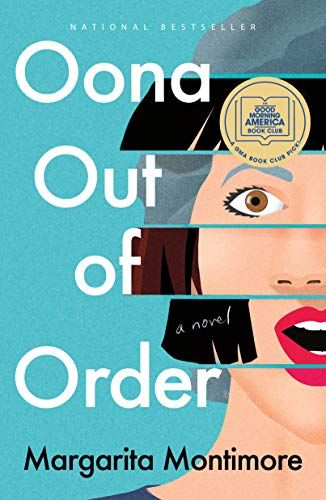
Oona Out of Order by Margarita Montimore
The premise of Margarita Montimore’s transfixing novel Oona Out of Order is enough to make any curious reader pick it up. Oona Lockhart is about to turn 19…but instead she faints and wakes up 51. As the title signals, Oona begins living her life out of order. Forced to hop through the years without knowing which age is next, Oona’s story demonstrates what magical realism is capable of. The book asks readers to think alongside Oona about what really matters across the years — and about what truly stands the test of time.
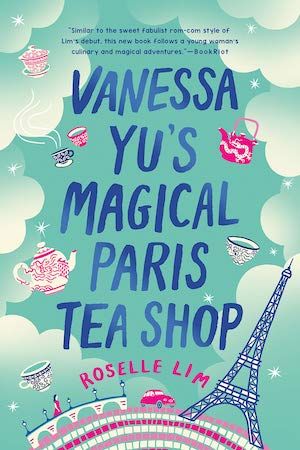
Vanessa Yu’s Magical Paris Tea Shop by Roselle Lim
Lim’s second novel is a sweet concoction. It’s one part love story, one part family drama, and one part foodie adventure. Vanessa Yu can predict the future, but she has no control over this gift. Instead, she is riddled with guilt by the predictions that escape her mouth and the pain they often cause. When she predicts the death of a dear family friend, she is devastated and flees to Paris with her Aunt Evelyn (also a clairvoyant) to learn to control her power. Even though she gave up on love long ago, she finds healing and direction in the romantic City of Light. In some ways, Lim’s novel reminds me of Laura Esquivel’s magical realism classic Like Water for Chocolate because of the way food and magic are intertwined in both books. In other ways, the book’s magic is all Lim’s: delectably delightful and invitingly intriguing.
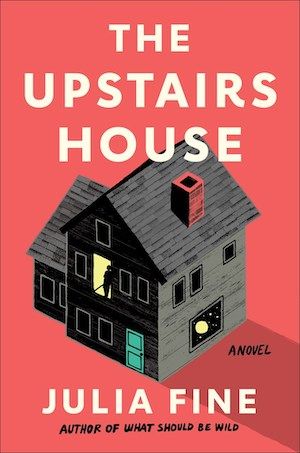
The Upstairs House by Julia Fine
The Upstairs House is surprising. For one thing, it’s a serious novel about postpartum depression…but it also has a sense of humor. New mother Megan Weiler is struggling through difficult emotional terrain in the wake of giving birth, and who turns up in her attic? The ghost of Margaret Wise Brown. (If the name doesn’t ring a bell, she was the author of many children’s books, including Goodnight Moon and The Color Kittens.) And then another ghost shows up, and things spiral even more. Thoughtful and complex, Fine’s novel uses the haunting to delve into larger issues around Megan’s postpartum experience.

The Water Dancer by Ta-Nehisi Coates
If you’ve only heard of Coates’s nonfiction (such as Between the World and Me or We Were Eight Years in Power), you might initially be surprised that The Water Dancer is by the same author. However, if you’re familiar with his work on Black Panther, then The Water Dancer is likely a welcome addition to his fiction. Hiram Walker is an enslaved man in antebellum Virginia who has inherited the power of Conduction from his mother. Conduction gives him the ability to transport himself (and potentially others) when water is present. When his white half-brother drowns, Hiram lives because of his gift. This is how he learns about his ability to Conduct, which eventually connects him to the Underground Railroad. True to form, Coates’s fiction debut engages directly with the histories of slavery and racism in the United States. The Water Dancer doesn’t shy away from hard truths. At the same time, in an interview with Jesmyn Ward Coates said that long ago he promised his mother he’d write a romance for her and this book is the result.
While not everyone loves the label (and rightly so), magical realism novels continue to catch readers’ attention and garner widespread readership. If you look for them, you’ll find new magical realism novels at every turn. For instance, this fall keep your eyes peeled for Ruth Ozeki’s forthcoming novel The Book of Form and Emptiness, which promises to be a formidable addition to any collection of magical realism novels.
Want to read more about magical realism novels? Here are some great articles to get you started:
Magical Realism is For Us By Us and Toni Morrison Was the Queen

إرسال تعليق
0 تعليقات